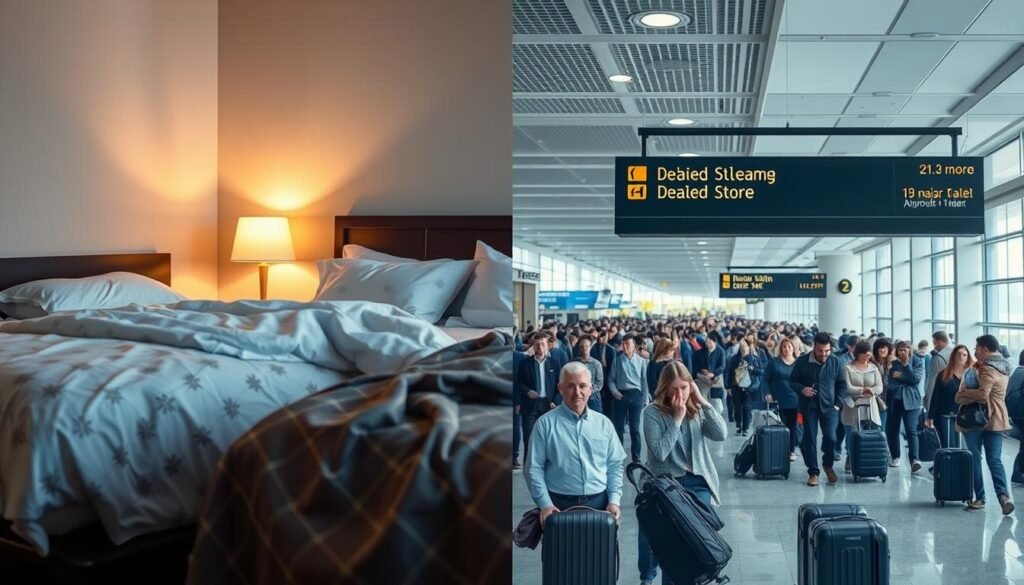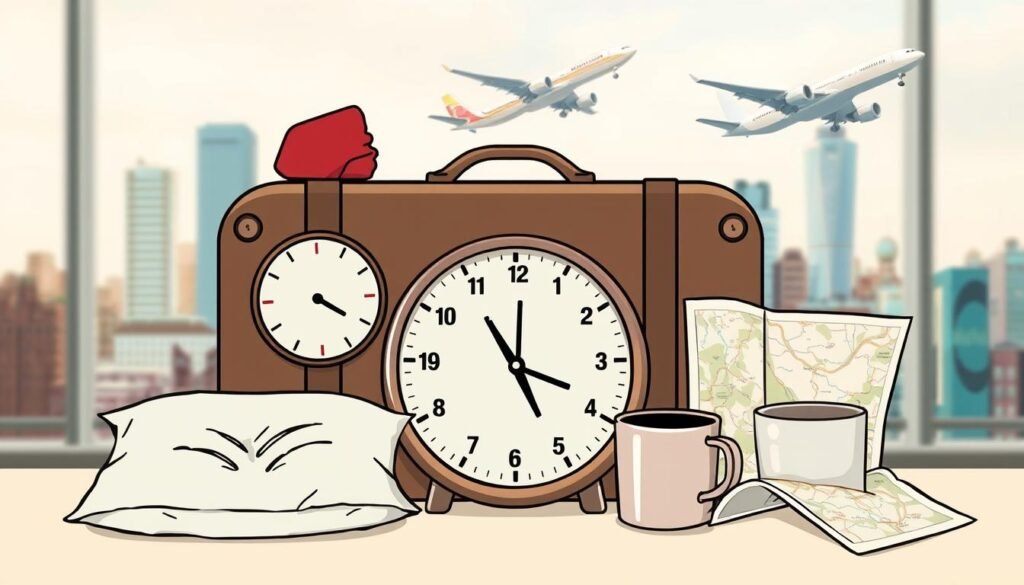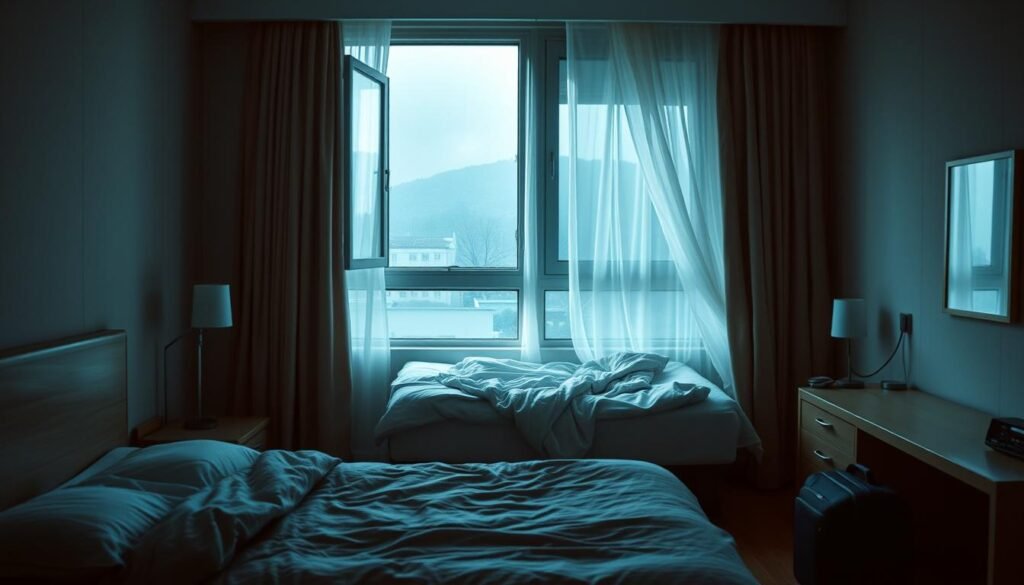Did you know that 75% of people get worse jet lag when flying east? This fact shows how much travel can mess with sleep. Many people find it hard to sleep well while traveling. They deal with jet lag, tiredness, and new surroundings. Sites like the Sleep Foundation show why knowing about sleep is key. Good sleep is crucial, but travel often makes it hard. This can hurt how we feel overall.
Key Takeaways
- Travel disruptions like jet lag and travel fatigue significantly impact sleep quality.
- Awareness of circadian rhythms can help manage travel-related sleep issues.
- Comfortable sleeping conditions can improve the overall travel experience.
- Only one-third of travelers report being satisfied with their sleep while traveling.
- Investing in quality sleep accommodations can lead to repeat business for hotels.
Understanding Travel Disruptions
Traveling can mess with how well you sleep. It’s not just the moving around, but stress plays a big role too. If you’re already anxious about travel, it gets even harder to find good sleep while away from home.
Jet lag is a big reason why travel can feel hard. It hits 60% to 70% of people flying far. Going east usually feels rougher than west. How many time zones you cross and motion sickness can affect your sleep, too.
Worrying about trips can make sleep problems worse. People who travel a lot for work, like flight attendants and pilots, really feel it. Also, older folks might have a tougher time adjusting. Knowing all this helps in dealing with travel’s tough parts.
The Science of Sleep and Travel
The science of sleep and travel is complex. It’s all about how our internal clocks, or circadian rhythms, work. These rhythms can get out of sync when we travel across time zones. This is especially true for eastward travel.
The 2021 Tokyo Olympics showed that elite athletes slept less and less well after long eastward trips. They had trouble getting used to the new time zone. It often took them several days to adjust, depending on how many time zones they crossed.
People who wake up early usually find eastward travel easier. Night owls do better flying west. This shows how personal biology can play a role. Also, men tend to feel less jet-lagged than women, maybe because of differences in body clocks and melatonin.
The length of your trip and how many time zones you cross can affect your sleep. Long trips can lead to jet lag that lasts for days. Flying east usually makes it worse. But, you can lessen jet lag by managing light exposure and keeping a regular sleep schedule.
How Travel Disruptions Affect Sleep
Travel can really mess up your sleep, especially because of jet lag. This happens a lot after flying long distances and going through different time zones. Your body’s clock gets out of sync with the local time where you are.
Some people have a hard time sleeping well because of this. They might find it hard to fall asleep or stay asleep. As the body tries to adjust, sleep patterns often get tossed around.
Jet Lag and Sleep Patterns
Jet lag messes with how you sleep, making you feel tired and out of sorts. You might deal with not being able to sleep, feeling easily annoyed, and not being as sharp. The more time zones you cross, the worse it gets. Usually, your body needs about a day to get used to each new zone.
Not managing this well can lead to bigger sleep problems. If you didn’t get much sleep before your trip, it can make things even harder. This can turn into a tough cycle that makes recovery even tougher.
Impact of Circadian Rhythms
Your circadian rhythms help decide when you should be awake and when you should sleep. Travel messes with these rhythms, making good sleep even harder to achieve. When you’re in a different time zone, the light around you can confuse your body’s clock. This might make you feel sleepy during the day and wide awake at night.
To help fix this, try to get some sunshine as soon as you can when you arrive. Also, try to keep your sleep times regular. Understanding how travel, light, and sleep all connect is key to handling sleep troubles when you’re on the go.

| Factor | Effect on Sleep |
|---|---|
| Crossing Time Zones | Disrupts circadian rhythms, leads to jet lag |
| Sleep Deprivation | Exacerbates jet lag symptoms, affects alertness |
| Inconsistent Sleep Schedule | Contributes to difficulties in falling asleep at night |
| Environmental Changes | Can lead to anxiety, impacting sleep quality |
| Light Exposure | Essential for resetting the body clock |
The Role of Travel Fatigue
Travel fatigue comes from both physical and mental stress during trips. Long trips mean sitting a lot, which can make you uncomfortable. This discomfort and adjusting to new places increase anxiety. Knowing about these stressors is key for travelers to lessen fatigue and stay well.
Physical and Mental Stressors
Travel involves various physical stressors like being stuck in a seat during long flights. This might cause back pain or neck strain, leading to tiredness. Meanwhile, mental stressors come from dealing with new places, keeping up with schedules, or meeting work deadlines. These issues lead to travel fatigue, making the trip less enjoyable and affecting your health.
Signs of Travel Fatigue
It’s important to know the signs of travel fatigue so you can manage it. Common signs include:
- Exhaustion and feeling low on energy
- Headaches and migraines
- Being more irritable and having mood swings
- Having trouble focusing or not doing well in tasks
Travel fatigue often causes bad sleep and even insomnia. A survey found nearly 40% of adults say it ruins their sleep. To improve sleep and travel experiences, consider adjusting when you eat and using melatonin for jet lag.

The First Night Effect in New Environments
Travelers often face the first night effect, leading to poor sleep in new places. This is thought to be due to our brains staying alert for dangers. Knowing this can help us sleep better when traveling.
Research on Sleep Quality
A recent study showed changes in brain activity when we sleep somewhere new. The left side of the brain sleeps less, making us react more to sounds. This difference makes our sleep on the first night less deep.
Adaptive Sleep Mechanisms
Our sleep changes in new places might be an old survival trick. Like marine animals, we stay alert even when asleep. This makes us more sensitive to noises and changes around us. By understanding this, we can make sleeping in new environments easier.

Jet Lag: A Major Sleep Disruption
Many travelers find jet lag a big problem. It occurs when you cross at least two time zones. It affects your body and mind. Symptoms include feeling sleepy during the day, mood swings, stomach problems, and trouble sleeping.
Adjusting to a new time zone is hard, especially if you’re crossing many zones.
Understanding Jet Lag Symptoms
Jet lag can cause many problems. Your body’s clock gets out of sync. This leads to:
- Difficulty sleeping at bedtime
- Problems waking up in the morning
- Fatigue and daytime sleepiness
- Poor sleep quality
- Difficulty focusing and memory issues
- Reduced mental and physical performance
Studies show it takes about 1 to 1.5 days to adjust to each new time zone. It’s harder to adapt when flying east.
Strategies for Managing Jet Lag
There are good ways to deal with jet lag. Here are some tips:
- Start changing your sleep routine before you travel.
- Drink plenty of water to fight off tiredness.
- Use bright light to help reset your body’s clock when you arrive.
- Melatonin can help ease jet lag without serious side effects.
- Get into the new time zone’s sleep cycle right when you get there.
Using these methods can help you handle jet lag better. They make adjusting to new time zones easier.
| Jet Lag Symptoms | Possible Strategies |
|---|---|
| Daytime sleepiness | Adjust sleep schedule pre-travel |
| Insomnia | Use melatonin supplements |
| Mood changes | Stay hydrated and avoid caffeine |
| Gastrointestinal discomfort | Maintain a healthy diet and hydration |
Common Sleep Disturbances While Traveling
Traveling brings exciting adventures but can disrupt our sleep. Things like environmental noise and uncomfortable sleeping conditions affect how well we rest. Learning about these challenges helps us pick strategies for better sleep while exploring new places.
Environmental Noise and Light
Environmental noise is a big reason travelers can’t sleep. It comes from traffic, noisy hotel neighbors, or air conditioners. These noises make it hard to fall asleep deeply. Light also messes with our body clocks.
Many find using earplugs or sleep masks helps by blocking out sound and light. Changing your light exposure to fit the new time zone also helps improve sleep.
Uncomfortable Sleeping Conditions
Sleeping in places that aren’t comfortable is another issue. It could be a strange bed or bad bedding that makes sleeping tough. Bad sleep in hotels previously can make us dread it even more. This worry makes sleep harder to come by.
Doing relaxing activities before bed helps, like reading or meditation. White noise apps are also great for setting a sleepy mood.
| Common Sleep Disturbances | Possible Solutions |
|---|---|
| Environmental Noise | Use earplugs, sleep masks, or white noise apps |
| Uncomfortable Bedding | Bring familiar bedding or travel pillows |
| Light Exposure | Adjust light exposure to match local time zone |
| Travel Anxiety | Practice relaxation techniques |
Understanding and addressing these sleep blockers can make trips better. For more sleep tips while traveling, see these recommendations. Learning to manage sleep issues is key to fully enjoying your travels, no matter where you go.
How to Promote Better Sleep Hygiene While Traveling
Traveling can mess up how well we sleep. It’s crucial to focus on ways to sleep better. Some key steps include making a sleep-friendly setting and keeping a regular sleep routine. Doing these can help improve how restful our sleep is when we’re on the move.
Creating a Sleep-Conducive Environment
Making a good sleep environment can really help you sleep better. Here are some top tips:
- Use earplugs and eye masks to block out noise and light.
- Set the room temperature to cool to help you sleep better.
- Choose hotels that are quiet and peaceful.
- Bring things like your favorite pillow to feel more at home.
Maintaining a Consistent Sleep Schedule
Keeping a regular sleep schedule is hard when traveling, but it’s very important. Here’s how you can do it:
- Try to sleep and wake up at the same times you do at home.
- Drink less caffeine and alcohol before bed to help you sleep better.
- Take short naps of 20-30 minutes if you’re feeling tired, but not at night.
- Do relaxing activities like deep breathing to help get to sleep.
These tips can help you adjust to new places and schedules. They improve your health and how alert you feel when traveling. By focusing on good sleep habits and creating the right environment for sleep, you can greatly better your sleep while traveling.
Tips for Overcoming Sleep Deprivation on the Road
To beat sleep deprivation, drivers must drink plenty of water and eat right. It’s key to stay hydrated as lack of water makes tiredness worse. Choosing light, healthy foods like fruits, nuts, and whole grains helps keep energy up and avoid feeling slow. Eating well can also improve your sleep quality, which is crucial for those driving.
Hydration and Nutrition Choices
Drinking water regularly during a drive can fight off tiredness and keep your energy even. It’s also necessary to eat smart; foods high in antioxidants, vitamins, and minerals boost brain function and alertness. For those trying to overcome sleep deprivation, following these nutrition tips is important.
Relaxation Techniques Before Bedtime
Relaxing well before bed also helps with sleep quality. Deep breathing, meditation, or gentle stretching eases the mind and body into sleep. Making your sleeping area calm by cutting down on noise, soft lighting, and sticking to a sleep schedule helps too. With these nightly practices, drivers can enjoy deeper sleep and be more alert while driving.